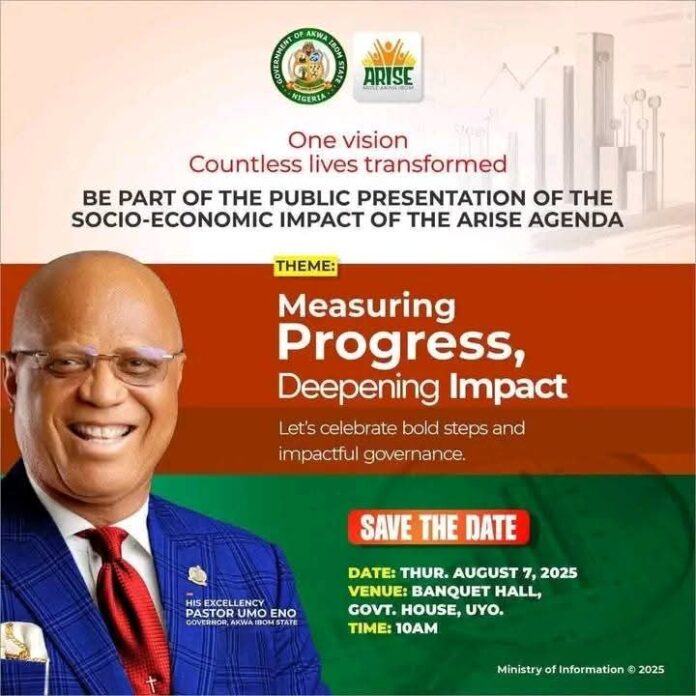…TOUCHING LIVES, BUILDING FUTURE
Two years ago, the ARISE Agenda was launched in Akwa Ibom State by Governor Umo Eno with a clear promise to make governance people centred, impactful and measurable. Today, that promise is beginning to take shape in the lives of ordinary people across the 31 Local Government Areas.
In villages like Afaha Ikot Ebak and Ibakachi, children now learn in newly constructed model schools with classrooms that have fans, libraries with books and water running from taps. Their parents many of whom never had such an opportunitynow watch with hope as their children carry neatly packed bags to school each morning. These schools are signs that government is listening and investing in the next generation.
Another cheering news is that for years, retired civil servants lived with the pain of being forgotten. Many struggled with health issues, unpaid bills and quiet frustration. That has begun to change as over 75 percent of the backlog of gratuities has now been paid. Elderly men and women today walk out of banks smiling with dignity restored and burdens lifted. It is one of the most emotional outcomes of the reforms of the administration and one that continues to resonate across the State.
Across towns and rural communities, construction is underway. Roads once overtaken by potholes are now smooth and accessible. In Eket, the 8.5 kilometre dual carriageway linking the town to Etinan is easing transport and boosting local business. In places like Ukanafun and Nsit Ubium, traders now move their goods with ease while farmers can reach markets faster and health emergencies are no longer delayed by bad roads. These projects have brought not just concrete and asphalt but mobility, safety and opportunity.
The health sector is also receiving a push. Mothers no longer have to travel far to seek help for a fever or childbirth. Through the One Primary Healthcare Centre per Ward policy, more than 55 Healthcare Centres have been rebuilt, restaffed and equipped across the State. In localities like Okobo and Udung Uko, women now deliver their babies in clean, well lit facilities attended to by qualified Staff often within walking distance from home.
There is also fresh hope for job seekers. The recent announcement of 3000 new job placements in the Civil Service, Teaching Service, and Health sector is not just about numbers. It is about real young men and women, graduates, breadwinners and parents finally being given a chance to serve, earn and grow. It is about unlocking human capital that had been lying dormant for too long.
But perhaps one of the most transformative ideas is thedecision of the State to take control of its own development story. For too long, figures released by the National Bureau of Statistics (NBS) painted a confusing picture of data that didnot match what people were seeing or living through. Now with the creation of the Akwa Ibom State Bureau of Statistics and the Ministry of Digital Economy, the government is collecting data directly from Communities. Officials of government will now sit with farmers in Ini, traders in Ibesikpo and health workers in Esit Eket to ask real questions and document real answers.
This grassroots approach to data means that development would no longer be based on guesswork or projections. If a market in Oron needs a cold room or a school in Ika lacks teachers the data will reveal it. Investors can now make informed decisions about where to build, where to support and where to expand based not on assumptions but on truth.
Governor Eno an astute business guru in arriving at the decision is drawing examples from other parts of Nigeria to affirm the value of this direction. Lagos State for instance uses its residents’ data to plan more targeted health and education services. Kaduna State on the other hand introduced dashboards that helped track the performance of schools and roads in real time. Akwa Ibom is following suit and in some areas and even setting a new benchmark.
Looking forward, the next phase of the ARISE Agenda must go deeper. Community based Cooperatives should be expanded especially in agro processing and creative industries. Local Governments need more tools to act based on the data being collected. Special economic zones could emerge in Ini, Ibeno and Mbo Local Government Areas where young people would be trained, employed and empowered in industries tied to their environments such as rice milling, fish processing and tech services.
The momentum is building across the State and there is a growing sense that something is changing not just in policy but in the way people live and feel. The ARISE Agenda may be two years old but it has already begun to redefine the “future one road, one school and one family at a time”.
This is not development for the sake of development. It is a development that touches lives, builds futures and gives every citizen a reason to believe again.
To further institutionalize this culture of accountability and shared progress, the public presentation of the Socio Economic Impact of the ARISE Agenda in Two Years with the Theme Measuring Progress, Deepening Impact will hold on Thursday August 7 2025. This event will offer Stakeholders the opportunity to reflect on how far the State has come and how deeply the impact runs across Communities and sectors.
Ekerette Umanah – Political Economist and Policy Analyst.




